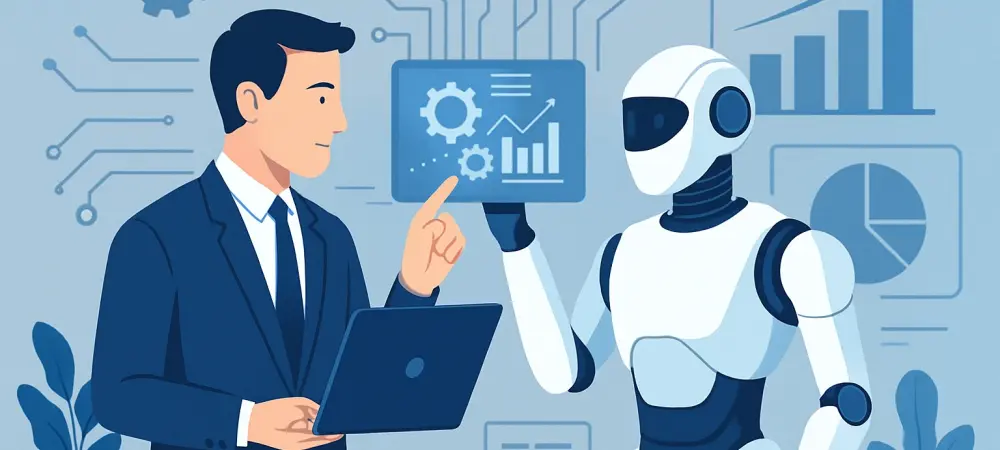In an era where the digital economy moves at breakneck speed, the concept of work is undergoing a profound transformation, driven by innovative technologies that challenge traditional business models. Imagine a workplace where tireless, highly skilled digital employees handle critical tasks around the clock, freeing human teams to focus on creativity and strategy. This is no longer a distant vision but a reality being shaped by cutting-edge solutions like those offered by Imperium AI. By introducing autonomous AI-powered digital employees, this technology is not just automating tasks but reimagining the very structure of modern organizations. These AI agents act as genuine team members, managing essential functions with professional expertise, and are poised to shift the paradigm of productivity and efficiency in ways previously unimaginable. This article delves into the transformative impact of such advancements, exploring how they are setting new standards for operational success across industries.
Revolutionizing Workplace Dynamics with AI
Transforming Task Management
The arrival of AI-driven digital employees marks a significant departure from conventional automation tools, as these agents take full ownership of complex roles with the proficiency of seasoned professionals. Unlike software that merely assists with repetitive processes, Imperium AI’s technology enables independent management of critical areas such as public relations, social media strategy, content creation, and advertising optimization across major platforms like Google, Meta, and TikTok. For example, a digital PR associate can craft press releases in mere minutes and handle media inquiries at any time, ensuring seamless communication. This level of autonomy eliminates the dependency on external agencies or expansive human resources for specific functions, streamlining operations in a way that traditional methods cannot match. The result is a workforce where efficiency is not just enhanced but fundamentally redefined, allowing businesses to operate with unprecedented agility in a competitive landscape that demands constant adaptation.
Empowering Human Creativity
Beyond simply managing tasks, the integration of AI employees creates a powerful synergy between human ingenuity and machine precision, reshaping the focus of human teams within organizations. By offloading time-consuming and repetitive responsibilities, these digital agents enable staff to dedicate their energy to higher-level pursuits like strategic planning, innovation, and creative problem-solving. Consider a marketing team no longer bogged down by the minutiae of scheduling posts or analyzing ad spend data; instead, they can brainstorm groundbreaking campaigns that resonate with audiences on a deeper level. This shift not only boosts morale by reducing burnout but also drives business growth through enhanced focus on value-added activities. The balance struck between human and AI capabilities underscores a broader trend: technology is not replacing human workers but amplifying their potential, fostering an environment where both can thrive in complementary roles that elevate overall productivity.
Driving Efficiency and Scalability in Business Operations
Unmatched Consistency and Adaptability
One of the standout benefits of AI-powered digital employees lies in their ability to deliver consistent, high-quality results without the limitations often associated with human labor, such as fatigue or variable performance. These agents operate 24/7, ensuring that businesses remain responsive and competitive in a global economy that never sleeps. Through advanced machine learning, they continuously adapt to evolving market conditions, refining their approaches to tasks like content creation or ad campaign management for optimal outcomes. Take, for instance, a social media strategist AI that identifies and capitalizes on emerging trends in real time, maintaining brand relevance without fail. This relentless availability and adaptability translate into a level of operational reliability that human teams alone cannot sustain, positioning companies to meet demands with precision and speed. Such capabilities highlight why AI is becoming an integral component of modern workforces, setting a new benchmark for what efficiency means in practice.
Cost-Effectiveness and Broad Applications
Another compelling advantage of adopting AI-driven employees is the significant cost savings and scalability they offer, making specialized talent accessible without the financial burden of traditional hiring processes. Businesses can bypass expenses related to recruitment, salaries, and ongoing training, instead leveraging digital agents to perform expert-level tasks at a fraction of the cost. This financial edge is particularly transformative for small enterprises seeking affordable expertise, as well as for large corporations aiming to streamline complex operations across multiple departments. From crafting SEO-optimized content to fine-tuning advertising budgets for maximum return on investment, the applications of this technology span diverse sectors and scales. This versatility ensures that companies of all sizes can harness AI to achieve more with fewer resources, reinforcing the notion that such innovations are not just a luxury but a strategic necessity for staying ahead in an increasingly crowded and demanding marketplace.
Reflecting on a New Era of Work
Looking back, the journey of Imperium AI in reshaping workplace dynamics reveals a clear shift toward a future where autonomous digital employees stand as pillars of efficiency and innovation. Their ability to manage essential functions with expert precision—whether in public relations, social media, or ad optimization—marks a turning point in how businesses approach productivity. By freeing human teams from mundane tasks, these AI agents unlock new avenues for creativity and strategic growth, proving that the collaboration between human and machine can yield extraordinary results. As industries continue to evolve, the insights gained from this transformation suggest a path forward: companies must prioritize the integration of such technologies to maintain a competitive edge. Exploring ways to balance AI capabilities with human strengths will be crucial, ensuring that the workforce of tomorrow not only adapts but thrives in a landscape defined by constant change and boundless potential.

